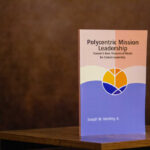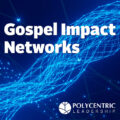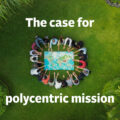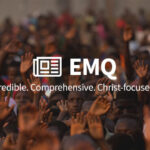Book Review
Polycentric Leadership: Toward a New Theoretical Model for Global Leadership
Reviewed by Mark D. Wood, PhD, Director of Kingdom Leadership Training Center, Darhan, Mongolia.
In an ever-changing, increasingly complex and globalized world, what opportunities are there to think differently about leadership? This is part of the question that Joseph Handley takes up in his book, Polycentric Leadership: Toward a New Theoretical Model for Global Leadership. Handley currently serves as president of Asian Access. Polycentric Leadership grows out of his PhD studies at Fuller’s School of Intercultural Studies.
The book is comprised of six chapters. Chapter 1, “Toward a New Theoretical Leadership Model,” serves as an introduction to polycentric leadership and an overview of what the book will cover. Handley shares several different voices in leadership, observing that we live in a uniquely global (Kindle Location 236) time that is changing significantly in complexity and difficulty and cannot be addressed by current models of leadership. In response to this need, Handley suggests a new model:
I envision a model of leadership that is polycentric – leadership that is collaborative, taking input from a rich diversity of sources in order to achieve better and more representative outcomes than the traditional top-down hierarchical or managerial approach to leadership that has been prevalent for decades. Over and above collaboration, decentralized leadership allows for each region of the world and every sector of a company to make decisions that are just in time and appropriate for the local context. (Kindle Locations 246-249)
In the second chapter, “Polycentric Mission History and Missiology,” Handley demonstrates that the concept of polycentric leadership is not a new concept but one that can be seen throughout history. Handley draws on the work of Allen Yeh, the Munich School, and others, challenging the belief that mission flows unidirectionally from Western missionaries. Instead, Handley argues, and I believe successfully, that mission, “rather than being unidirectional, [is] a circuitous, polycentric formation” (Kindle Locations 413-414). Consequently, polycentric leadership is a better fit for the contemporary age of mission than the unidirectional leadership structures of the past. One particularly interesting topic from chapter two is the assertion that polycentric leadership draws on —and is an expression of — the Trinity.
Chapter 3, “Polycentric Structures and Governance,” explores what the application of polycentric leadership looks like. Again Handley builds his argument from multiple sources, ranging from General Stanley McChrystal to the GLOBE study on leadership. Ephesians 4:7-16 is also a prominent passage that is referenced. The GLOBE study on leadership is evaluated by Handley to demonstrate connections to polycentric leadership.
Chapter 4, “A Model of Polycentric Leadership,” discusses themes that emerge from different theories of leadership that, in turn, form the basis of polycentric leadership. Handley discusses that polycentric leadership is still new and is considered an emerging paradigm for leadership, there is as yet insufficient research data (both qualitative and quantitative) to fully evaluate its effectiveness. (Kindle Locations 1497-1498)
In Chapter 5, “Interviews Within the Lausanne Movement,” Handley utilizes interviews with thirty-three leaders within the Lausanne Movement to correlate and confirm common themes or traits of his research on polycentrism. These themes, in turn, help to define polycentric leadership. The six themes are: collaborative, communal, diverse, entrepreneurial, relational, and charismatic.
In the final chapter, Chapter 6, “Toward a New Theoretical Movement,” the application of polycentric leadership is reviewed as it applies to the Lausanne Movement and to mission structures in general. Handley then discusses the implications of the study and provides suggestions for further areas of study.
Polycentric Leadership has a great deal to offer. Handley’s strength is getting us to think differently about leadership. I appreciated the book’s survey of leadership theory, which I found helpful in both challenging and expanding my concept of what leadership is. I fully agree that many of the hierarchical, centralized leadership structures are serving more as an obstacle than a means of empowerment. Additionally, the leadership dimensions that are explored in chapters four and five are helpful in self- evaluation reflecting on how our own leadership approach embraces the concepts or traits.
However, as intrigued as I am by the concept of polycentric leadership, I find myself struggling to articulate succinctly what it is. The theory of polycentric leadership is not easy to define. As I read this book, I reflected it would have been helpful to have more “on-ramps,” or ways that readers could practically apply the concept of polycentric leadership to their own contexts. Perhaps moving beyond theory would be an opportunity to be explored in future work. I wonder, since polycentric leadership works well in a movement such as Lausanne, what does it look like in a church or team?
I recommend Polycentric Leadership to readers who are wanting to be challenged and have their understanding of leadership expanded. The book will appeal to those interested in leadership theory, particularly those in mission leadership. I also think that it would make a helpful supplemental text for students to consider alternatives to current models of leadership.
Wood, M. D. (2023). Book Review: Polycentric Leadership: Toward a New Theoretical Model for Global Leadership by Joseph W. Handley, Jr.. Great Commission Research Journal, 15(1), 173-175. Retrieved from https://place.asburyseminary.edu/gcrj/vol15/iss1/17
Published on 4/1/2023 by ePLACE: preserving, learning, and creative exchange, 2023. Reposted with permission.










